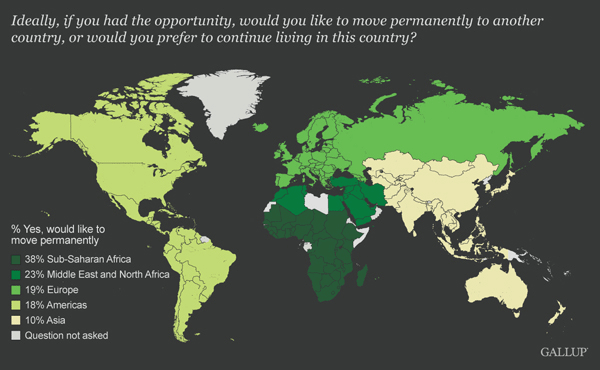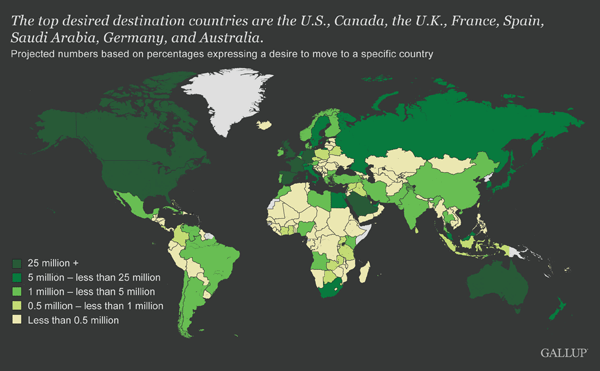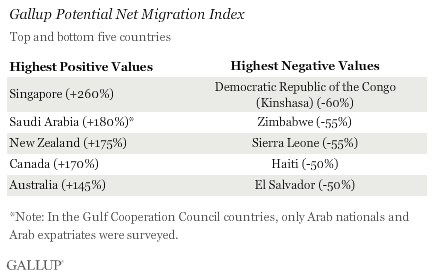WASHINGTON, D.C. -- Every day, migrants leave their homelands behind for new lives in other countries. Reflecting this desire, rather than the reality of the numbers that actually migrate, Gallup finds about 16% of the world's adults would like to move to another country permanently if they had the chance. This translates to roughly 700 million worldwide -- more than the entire adult population of North and South America combined.

From its surveys in 135 countries between 2007 and 2009, Gallup finds residents of sub-Saharan African countries are most likely to express a desire to move abroad permanently. Thirty-eight percent of the adult population in the region -- or an estimated 165 million -- say they would like to do this if the opportunity arises. Residents in Asian countries are the least likely to say they would like to move -- with 10% of the adult population, or roughly 250 million, expressing a desire to migrate permanently.
United States Tops Desired Destination Countries
The United States is the top desired destination country for the 700 million adults who would like to relocate permanently to another country. Nearly one-quarter (24%) of these respondents, which translates to more than 165 million adults worldwide, name the United States as their desired future residence. With an additional estimated 45 million saying they would like to move to Canada, Northern America is one of the two most desired regions.

The rest of the top desired destination countries (those where an estimated 25 million or more adults would like to go) are predominantly European. Forty-five million adults who would like to move name the United Kingdom or France as their desired destination, while 35 million would like to go to Spain and 25 million would like to relocate to Germany. Thirty million name Saudi Arabia and 25 million name Australia.
Roughly 210 million adults around the world would like to move to a country in the European Union, which is similar to the estimated number who would like to move to Northern America. However, about half of the estimated 80 million adults who live in the EU and would like to move permanently to another country would like to move to another country within the EU -- the highest desired intra-regional migration rate in the world.
Most of the world's international immigrants, according to the 2009 United Nations' Human Development Report, move from one developing country to another developing country or between developed countries. Gallup's data would suggest then that the countries people desire to migrate to permanently do not necessarily reflect reality -- especially in regard to developing countries. Eighty percent of those in developing countries who would like to move permanently to another country would like to move to a developed country, while 13% of respondents in developed countries would like to move to a developing country.
Gallup's Potential Net Migration Index
If all adults who desire to move to another country permanently actually moved to their desired destination country today, some countries would suffer tremendous losses in human capital and others would be overwhelmed. Gallup's Potential Net Migration Index (PNMI) is the estimated number of adults who would like to move out of a country permanently subtracted from the estimated number who would like to move to it, as a proportion of the total adult population. The higher the resulting positive PNMI value, the larger the potential net population gain.
Across the countries surveyed, Singapore posts the highest positive PNMI of all countries and areas, with a net migration index value of +260%. This means that Singapore's adult population would increase from an estimated 3.6 million to as high as 13 million. The Democratic Republic of the Congo (Kinshasa) posts the highest negative PNMI, with a net migration index value of -60%, which means its adult population would decrease from an estimated 32 million to as low as 13 million.

Implications
While Gallup's findings reflect aspirations rather than intent, they suggest hundreds of millions are feeling pulled or pushed, for various reasons, toward countries other than their own. Who these potential migrants are, where they'd like to go, and why, will continue to be crucial for leaders in countries of origin and destination to understand as they develop migration and development strategies during the economic crisis and well after. In most countries, Gallup's data show people's desire to relocate to another country permanently did not decrease meaningfully after the global economic crisis hit in 2008.
For complete data sets or custom research from the more than 150 countries Gallup continually surveys, please contact worldpollpartners@gallup.com or call 202.715.3030.
Survey Methods
Results are based on aggregated telephone and face-to-face interviews with 259,542 adults, aged 15 and older, in 135 countries from 2007 to 2009. The 135 countries surveyed represent 93% of the world's adult population.
For most countries, aggregated sample sizes (across three years of surveys) range between 1,000 and 3,000 interviews. One can say with 95% confidence that the country-level margin of sampling error, accounting for weighting and sample design, ranges from ±3 percentage points to ±6 percentage points. Results are projected to the total population of each country aged 15 and older, using 2008 World Bank population estimates.
